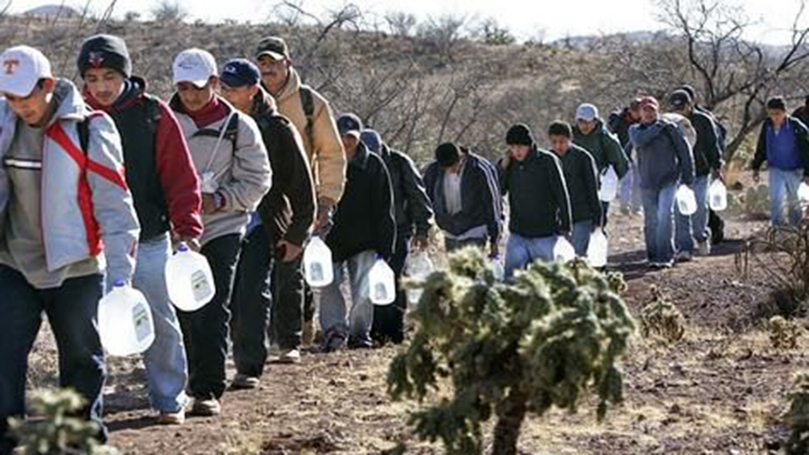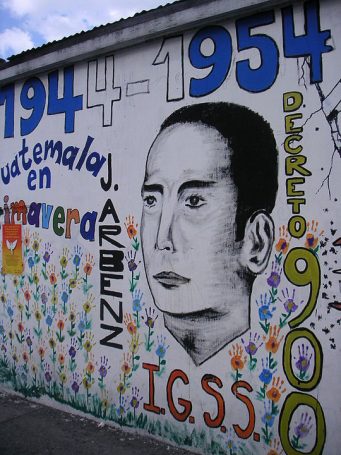
Much ink and hot air have been expended over the past several weeks about whether there is a “crisis” on the U.S.-Mexico border, caused by a big spike in the number of migrants and asylum seekers arriving there since the change in U.S. administrations.
The tone of the Republican versus Democrat argument often takes on a semantic character. In the opinion of this writer, there is indeed a major crisis, but it is not new; rather it is rooted in the way U.S. imperialism has interacted with the nations and peoples of Central America and the Caribbean for well over a century.
It is not so much a crisis for the United States or even for the population of the U.S. side of the border with Mexico. It is, however, an enormous crisis, involving massive poverty, suffering, and death, for millions of people in the countries from which the migrants and refugees, both young and old, are arriving. And the actions of the U.S. ruling class and state over many years are at the root of this crisis.
The “root?” Lip service is now being paid to this phrase: We’ve got to get to the “root of the problem,” which is in the Northern Triangle Central American countries of Guatemala, El Salvador, and Honduras. But the solutions cannot be blocking the arrival of migrants and refugees while subsidizing the governments of those countries in a way that does not improve the economic and personal security of their inhabitants.
Does the Biden administration, and do the Republicans, really understand what is the root of the problem in those countries, and in others such as Haiti, the Dominican Republic, etc.? I suspect they have more than just an inkling but do not want the U.S. public to understand the historical events that have brought so many people to such a desperate pass that they see no other option than to uproot themselves, often put themselves in the hands of smugglers, and make a run to the Mexico-U.S. border where they have to brave more danger and humiliation — all with a faint hope of reaching safety on the U.S. side.
The history of U.S. relations with the poorer countries of Central America and the Caribbean has to be studied to get a real understanding of the roots of the present situation.
The Monroe Doctrine, and especially the 1905 Roosevelt “Corollary,” established the idea that the United States reserves the right to intervene in the internal affairs of the nations of Latin America and the Caribbean when the situation in those countries affects U.S. interests. “U.S. interests” means, of course, not the interests of ordinary working-class people in the U.S. but those of the corporate elites.
Occasionally, people close to U.S. power centers are willing to recognize this publicly. In 1935, U.S. Marine Major General Smedley Butler, who had participated in many U.S. overseas military interventions from China to Mexico to Haiti and more, shocked the country’s political, economic, and military leadership with his book War Is a Racket. In this book, he scathingly compared the actions of the United States in the poorer countries of the world with those of Al Capone and his gangsters in Chicago. Only, he said, the U.S. military had by far outdone Capone in the multi-continental reach of its buccaneering expeditions which benefited only the wealthy capitalists in this country.
Have not been shy
Successive U.S. administrations have not been shy about intervening to change governments in the Western Hemisphere and beyond to suit U.S. business and geopolitical interests. This has gone on almost nonstop for more than a century. In the first thirty-five years of the twentieth century, U.S. forces were fighting and occupying one Central American country after another, not to mention Cuba, Puerto Rico, Haiti, and the Dominican Republic. U.S. intervention in Haiti, which had a definite racist edge to it, was particularly bloody. In 1919, to crush a Haitian rebellion against U.S. military occupation, U.S. troops treacherously ambushed and murdered Haitian patriot leader Charlemagne Péralte and distributed gruesome photos of his corpse, to send a message that resistance to the United States was futile. Péralte had fought for friendship and unity between the peoples of Haiti and the neighboring Dominican Republic, another of his “sins.” The leaders of the United States much preferred people like Dominican dictator Rafael Trujillo, who ordered the massacre of Haitian migrant workers in his country.

The U.S. intervened in Guatemala in 1954 to overthrow the moderately left-of-center government of President Jacobo Arbenz, who was seen as “soft on communism” and a threat to the profits of the United Fruit Company, which had connections within the Eisenhower administration. This led to many decades of barbaric repression in Guatemala, leading to several hundred thousands of deaths. The efforts to overthrow the Sandinista government in Nicaragua, combat the left in El Salvador, and overthrow the government of Haiti in 2004, were only a few examples of U.S. imperialism’s overthrow and regime change efforts in Latin America in relatively recent times.
The U.S. connived in the overthrow of the moderately progressive government of Honduras in 2009. The result of that interference was the coming to power of two successive corrupt, right-wing governments, of Porfirio Lobo first and also of the current president, Juan Orlando Hernandez, both of whom have been accused of being up to their necks in corrupt relations with the drug cartels. The combination of corrupt, undemocratic, and repressive governments with the growth of the drug cartels (many of whose customers are in the United States) is a major factor in destabilization and violence in the Central American countries, and thus of the flight of thousands of people.
Working through these compliant, corrupt regimes, the U.S. has foisted on the nations of the area the Central America/Dominican Free Trade Agreement (CAFTA-DR), which like all such agreements, favors the wealthy foreign corporations and stunts the economies of the poorer nations.
On top of this, the Central American area has been hard hit by the results of global warming. This has manifested itself in very destructive hurricanes over the past several years, but also in a long-term drought situation over wide swaths of Guatemala, Honduras, and El Salvador — a drought which has ruined crops for several seasons in a row, and given the rural population little choice but to uproot themselves and hit the migrant trail. This global warming is also the result of the current capitalist mode of production.
Thus U.S. government policy and the actions of U.S.-based transnational capital, in combination with U.S.-allied local ruling classes, have created a situation of economic and personal insecurity, which is the driving force of the current migration. This is attested to by many, many interviews with migrants by charitable and human rights activists, as well as journalists of several orientations.
This is the real “crisis” and a dire one it is indeed. Neither the Biden administration nor the Republican opposition seems willing to recognize its real roots in the economics and geopolitics of imperialism. If that is the case, the solutions being proposed will not work.
This is revealed by the idea that what needs to be done to get to the root of the problem, in the countries of origin of the migrants and refugees, is to pour more U.S. money into the utterly corrupt and undemocratic regimes of the Northern Tier countries. This seems especially incongruous, as the U.S. government is moving toward a possible indictment of Honduran President Juan Orlando Hernández for being a close ally of the same drug cartels who make life a living hell for so many of his own countrymen and women.
In Honduras, Guatemala, and also Haiti there have been frequent, huge grassroots mobilizations against the corrupt governments in power. But the United States so far continues to see the governments against whom the peoples are fighting as its “key allies” against Venezuela and Cuba.
We in the CPUSA and the people’s movement in the United States have to speak out strongly against this century-old imperialist policy and demand changes that will include the recognition of the sovereign rights of the peoples and nations of the hemisphere to run their own governments without threats of destabilization and overthrow. Moreover, we need to oppose neoliberal trade policies and greatly step up the fight against global warming, for the good of workers in poor countries and in the United States too.
We must make sure that the citizens and voters in the U.S. are aware of the degree to which our own leaders, political and economic, have created this multinational crisis, and the steps needed to change these policies. Until then, migrants and refugees will continue to come and should be welcomed and supported in every way.
Images: Top, Casa Scalabrini – CPM Facebook; Mural of Arbenz, Wikipedia (CC BY 2.5).


 Join Now
Join Now